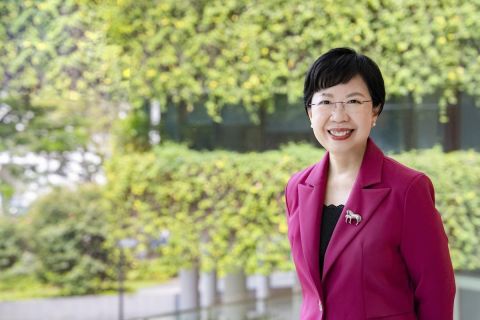
By Vince Chong
SMU Office of Research Governance & Administration – Imagine that there is a certain unbridled rivalry between departments of an organisation, with management hoping to cultivate this competitiveness without it spilling over and hurting bottom lines.
This is but just one practical scenario that SMU Associate Professor of Psychology Tsai Ming-Hong hopes to address with his research paper Can Confidence Influence Persuasiveness in Disagreements by Conveying Competence versus Dominance? The Moderating Role of Competitiveness.
In a nutshell, it examines how expressed confidence can signal competence or dominance, and how this plays out differently when people disagree. As the above scenario suggests, it might lead to less than positive consequences.
The study was co-authored by Associate Professor Laura Rees, College of Business, Oregon State University, USA; Professor Shirli Kopelman, Stephen M. Ross School of Business, University of Michigan, USA; and Professor Hu Hsiu-Hua, Department of International Business, Ming Chuan University, Taiwan.
As Professor Tsai told the Office of Research Governance & Administration (ORGA), his interest in the topic was piqued over the years by how conversational style affects influence, and “how easy it is to mistake dominance for expertise in many different settings.”
“We show that in low-competition contexts, high confidence boosts persuasion via competence signals,” he said.
“But in high-competition settings, this may come across as dominance and can backfire.”
Timely study
Published in 2024 in Negotiation and Conflict Management Research (NCMR) – the renowned flagship journal of the International Association of Conflict Management – the paper was well received for its potential impact to real life scenarios, particularly in this age of social media.
“The rise of social platforms has dramatically amplified the reach – and speed – of confident voices,” he said.
“It’s made researching confidence signals even more pertinent since cues like tone, phrasing, and prominence carry such weight online.”
While most prior research looked at how individuals gain social influence by appearing confident and hence competent, the SMU academic and his team extended it by exploring how “felt competitiveness, as reflected by perceptions of goal opposition between perceivers and others” affects expressed confidence, and how this ultimately shapes persuasiveness.
As the paper sets out, “higher competitiveness will lead perceivers to view expressed confidence both as a signal of less competence and as a signal of more dominance because people tend to discount a perceived competitor’s knowledge.”
Take online platforms for example, Professor Tsai pointed out. When like-minded groups rally around a confident speaker online – an echo chamber, or a state of low competition – that confidence reinforces perceived expertise.
“But in contested debates … the same level of confidence can trigger pushback as a domineering tactic,” he said.
He further acknowledged that the internet often magnifies the loudest voices, which “flattens nuance”. And with mountains of online content mixing falsehoods with genuine fact, a message seemingly backed by expressed confidence might not be competent at all.
Consequently, when underlying assertions are incorrect, “competence cues lose their value”.
“In that case, confidence can lend credibility which makes it even more important for audiences to critically evaluate the substance,” Professor Tsai said.
One practical implication, he added, is to train people to look for evidence and consistency, rather than just fluency or confidence.
“From a psychological standpoint, that makes our work more urgent: understanding when confidence signals competence versus dominance can help communicators and platforms mitigate unproductive polarisation,” he noted.
Practical impact
In Can Confidence Influence Persuasiveness in Disagreements, the researchers conducted three studies examining interpersonal dynamics in disagreement contexts. These were held across Taiwan, Canada, and the USA, with participants comprising adults, such as coworkers, and students.
The project also factored in the diminishing of social influence with age by ensuring that participants spanned a relevant age gap of between the early 20s to the mid-to-late 30s.
Based on its results, it offers practical suggestions for situations like the one mentioned at the start of this article. Companies, it points out, could mitigate competitiveness – and the potential for disagreements – by implementing joint work incentives rather than policies that reward the individual.
Doing this hence boosts “associations between expressed confidence and perceptions of competence,” rather than the less salubrious assertions of dominance between rivals.
The interaction between the paper’s co-authors also lent credence to its findings, Professor Tsai recalled. This came about when one of them “confidently recommended” NCMR, which aligned with the group’s topic and intended readership.
“Her recommendation came with confidence and in a collaborative, low-competition setting,” he explained.
“In the end, we agreed that NCMR provides both the targeted visibility and topical fit for our manuscript.”
Going forward, the academic believes that future research could build on their findings to test, for instance, such dynamics in live-video debates or social-media comment threads to capture real-world signalling. They could also look at whether training programs – like brief “confidence literacy” modules – might help people better distinguish competence from dominance online.
Then there are papers that could explore how individual differences, such as cultural backgrounds, moderate the way confidence signals are received. In short, there is still much to find where this area of science is concerned.
Ultimately, the key to understanding how people behave lies in deciphering what makes us tick, Professor Tsai said. That is partly why he became a psychologist, after realising “how understanding human judgement could improve real-world decision-making.”
The fact that social media and the internet play an oversized role in society today “underscores why psychology is essential today,” he added.
“It offers tools to understand why we react to certain messages and how to design interventions that promote healthier communication.”
Back to Research@SMU August 2025 Issue
See More News
Want to see more of SMU Research?
Sign up for Research@SMU e-newslettter to know more about our research and research-related events!
If you would like to remove yourself from all our mailing list, please visit https://eservices.smu.edu.sg/internet/DNC/Default.aspx

